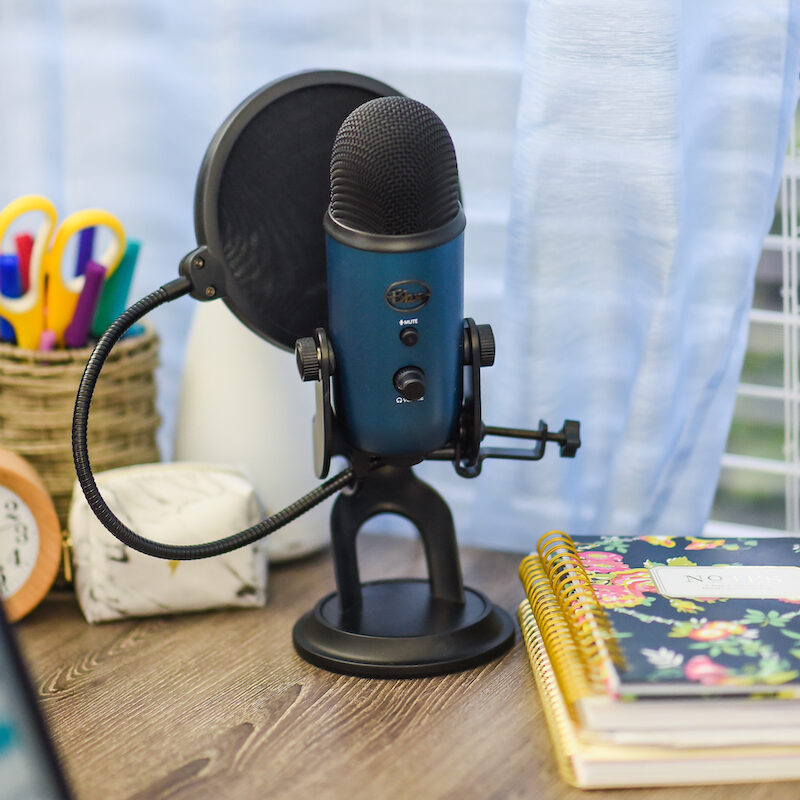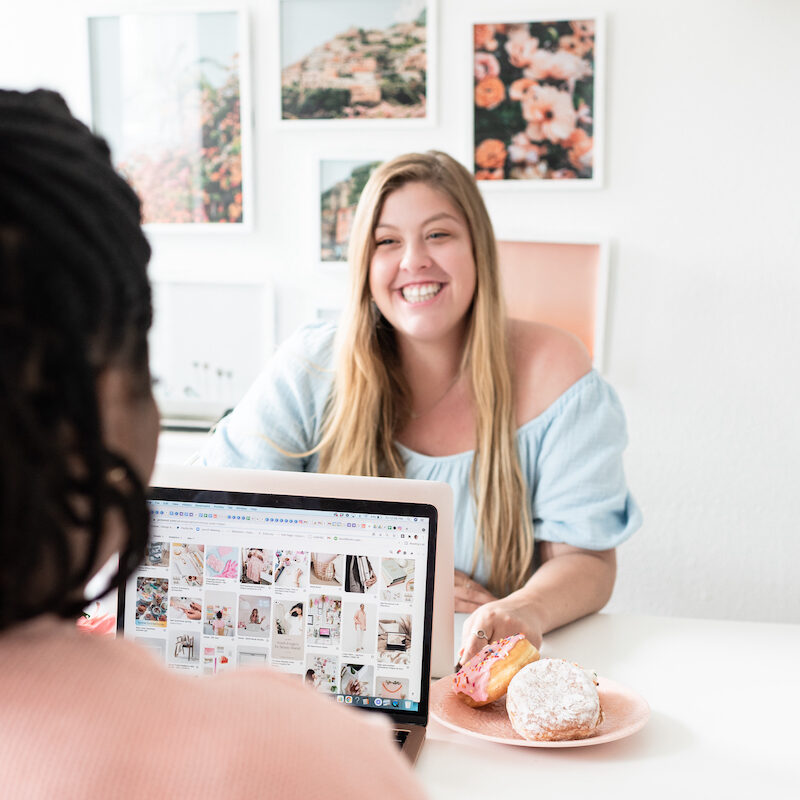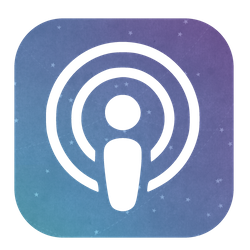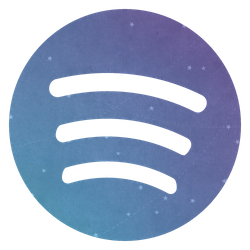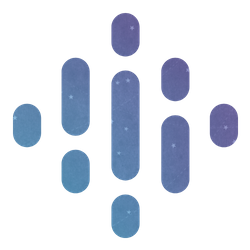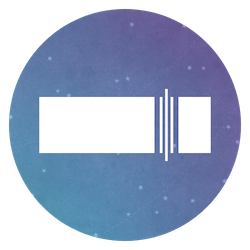episode 08
Freebies & Why They Don’t Work for Web Designers
Freebies are geared towards people who want just that, free information. They are not geared towards people who are looking to pay thousands of dollars for a web design service.
Today Sam & Karyn are sharing the importance of focusing your attention and effort on attracting clients who are looking for your services and actionable steps you can take right now to break free from the freebie.
Episode 08: Freebies & Why They Don't Work for Web Designers
Show Notes:
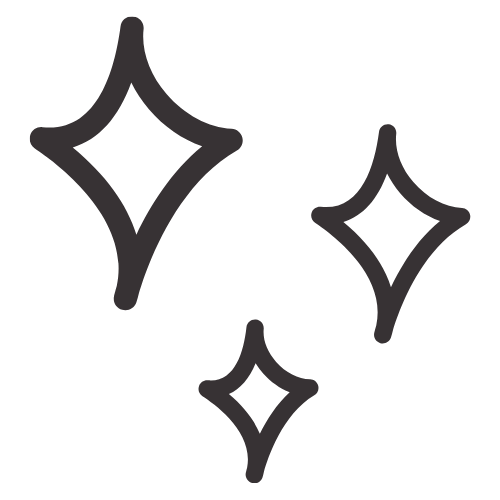
Understanding what freebies are, what they’re intended to do, the types of businesses benefit from using them, and the types of people who are attracted to them.

Ways you can show your expertise and highlight your credentials without teaching others to do what you are trying to get paid to do.

How you can use discovery calls to still hit all of the touchpoints of a sales funnels, in a quicker, more personable way.

Understanding that how you attract your clients sets the tone for your working relationship with them.
Episode Transcript:
Karyn Paige, Sam Munoz
Sam Munoz 00:00
It is more so to have an there’s like an end in which you are now working with that person versus teaching them and equipping them with the skills required to do it themselves. And establishing expertise can look totally different. I think it’s still important to say that you are an expert in what you do. I think that the the core message there is important, but you can do that through tons of different ways that does not include teaching people how to do it, it can be creating a really, really good portfolio that shows that you know how to do what you’re talking about what your service is, in that portfolio, it can be creating case studies where you show before and after and the results that your clients have. And why did they have those because you’re the expert, it can be really listing out your credential your credibility, the things that make you good at the service. Welcome to making website magic where we empower women to step boldly into their web design businesses follow their intuition and claim the success they’re worthy of. I’m Sam Munoz.
Karyn Paige 01:01
And I’m Karyn page, where the tech wizards behind Sam Munoz consulting on the making website Magic School of Business. We’re two women here to talk about what it actually takes to run a web design business that’s aligned with your vision.
Sam Munoz 01:13
Spoiler alert, it probably isn’t what you think it is ready to hear about everything from refining your business vision, networking with intention and creating a magical client experience. Let’s do it.
01:29
Hey, Karyn. Hey, Sal,
Sam Munoz 01:32
I am stoked to talk about this topic today, which is freebies, and why they don’t work for web designers, this is going to be such a rich topic. And ladies, we are looking at our outline here. And we’ve got thoughts for days. So buckle up and buckle in for this conversation. But I know before we start talking, we actually wanted to read a review of the podcast.
Karyn Paige 01:56
Yes. Okay. First, let me just say we’ve been getting some stellar reviews since we launched this podcast. Thank you so much for all of the love and support and the feedback, it is so meaningful to us that you’ve taken the time out to leave a review, leave a rating. So thanks to everybody who’s been doing that so far. And let me pull up this amazing review that we have right here. This one is called for women, web developers and designers. And it says, if you are a woman running a web design business, you need this podcast in your life. exclamation point, Sam and Karyn are two talented ladies who are filling a much needed gap with this podcast and sharing the details. And behind the scenes for women, web designers. They are a joy to listen to. And every episode is full of gems, exclamation point. So thank you so much for that review. And if you want leave us a review, and maybe we’ll read it on the show.
Sam Munoz 02:51
Yes, thank you so much. I love that you said the punctuation because the excitement is felt and we share that excitement too. So thank you so much for leaving that. So appreciate it. We’ve been reading every single one and just being so excited. We have like a little hype train in the background. So thank you.
Karyn Paige 03:07
Oh, yeah, okay, that’s the other piece too, just really quickly, like we actually read our reviews. So they’re not just going into the ether. Okay, just wanted to put that out there.
Sam Munoz 03:17
Love that. So let’s get into the topic for today, which is about freebies. And of course, as always, we’re gonna cut the jargon, and we’re gonna talk about what a freebie is. But before we even get to that, we’re gonna do a little experimentation here. And so we’re going to ask you to get vulnerable. If you’re listening to this, when you’re walking outside, I don’t even care. I want you to do this. So raise your hand if you’ve ever made a freebie before hand raised. Keep your hand up. If you’ve made more than one freebie. My hand is still up. Keep your hand up if you’ve actually booked a one on one web design client from your freebie. Our hands Yeah, it’s down. Crickets crickets as they were up another. So the point there being a lot of us have tried this whole freebie thing. But more likely than not, it hasn’t actually yielded one on one web design client directly from that freebie, and that’s what we want to talk about today. So let’s start with cutting that jargon. What on earth is a freebie and what are we talking about?
Karyn Paige 04:16
Okay, so freebie is some sort of free resource. Think Like a checklist, a guide, a PDF, something that is connected to your email list,
Sam Munoz 04:28
right? So it’s used to generate leads, so to generate email addresses to get those email addresses and then to funnel people and market to them in a one to many capacity via email. And if you listened to Episode Seven, we actually talked about the email list versus the contact list. And this technique of marketing via an email list is really not as effective for a web designer, as we discussed in that last episode. So the freebie part of it though, that’s kind of the beginning of that funnel. And that’s like the main reason it doesn’t work well for a web designer. Is because that method of one to many marketing just doesn’t make sense. So that’s kind of like the first reason it doesn’t work and a little explanation of what it is. So again, PDF, checklist guide, that’s the thing that everyone’s like, Oh, go create an opt in, go create a freebie, create something free, so that you can funnel people through to sell them something where they actually have to pay for it on the back end.
Karyn Paige 05:22
And freebies are really great if the leads that you’re trying to attract are looking to learn something DIY. But it’s not really great if you’re trying to attract someone who’s going to pay for done for you services, which is our business model.
Sam Munoz 05:37
And that’s like one of the one of the main points we wanted to touch on was the fact that freebies are attracting those di wires versus people that do want to pay for that done for you stuff. And also a freebie is a part of a funnel, that’s like the second thing we wanted to discuss. a freebie is a part of a funnel intended to lead to some sort of low ticket offer often so not like a $5,000 website. But instead, like the end of that funnel is typically like a self paced course, or something else they can DIY or a product, a digital product, which that’s not what we’re selling, we’re selling done for you one on one high ticket services.
Karyn Paige 06:12
So here are the type of people that freebies attract in the first place, right, the DI wires of the bunch, right? So people who are looking for quick wins, like the five things, you know, five best snacks to eat that are, you know, going to give you protein throughout the day, or like 101 tools that every RV camper should have in your motorhome or something like that. Right. So quick wins,
Sam Munoz 06:38
which To be fair, like that’s, that was like the type of freebie I created in the beginning to was like the five essential things that every person with a website needs. super helpful. Sure, like a quick one. Yes. But like, that’s something that I can teach people through the work we’re doing together. They don’t have to DIY that.
Karyn Paige 06:53
Yeah, absolutely. The real thing about like, these freebies is that they take a ton of time to create, right, a lot of time, so much time that you could be working on this for a few months trying to like really figure out what people want what people need, and then actually compiling it into some sort of PDF or you know, whatever. So
Sam Munoz 07:16
yeah, which I remember we talked about in the last episode, because it’s like, it’s not even just creating the opt in which just to create the opt in, I know, I was in a course that taught us about creating an opt in, and it was like, okay, go do market research, go figure out what people need, give it a name, create the asset, you know, make the worksheet then do the funnel. And like all these things that go along with it time that could be spent serving clients, connecting with clients, you know, getting on Discovery calls, perfecting your portfolio, things that are actually going to lead to money generated versus getting 12 people on email list that are all di wires that don’t even want to hire you. And that’s where things get weird. And I think that, again, we talked about this a lot. It’s almost like to no fault of our own, because this is like what’s being shoved down our throats. But there’s this whole thing about like, you have to teach people to establish your expertise. And I just have horribly disagree with that. You can be an expert, and not teach people what you do. When did we start equating you establishing expertise with your ability to teach people and I actually have a friend, her name is Cassie Reiter, and she is a curriculum specialist. And she constantly talks about how just because someone’s good at their service doesn’t mean that they’re a good teacher. But that doesn’t reflect that they’re bad at their service. Yeah,
Karyn Paige 08:28
I really want to like, stick here in this like space of like, when did the teaching prove that you’re an expert thing? It’s almost like there’s a whole camp. There’s a whole like group of folks that started this like teaching thing. And I think those people were like, like bloggers, right? When I think about it, I’m always thinking about their people who were cooking, or baking or knitting or like living in a van down by the river and like making that work. So the whole thing was aspirational. Like they were living a lifestyle that you were interested in, or they were doing something that you were interested in doing. And so they were like, let me teach you how to do it too. And then you can have a life that’s similar to mine, right? Or, like, I lost 100 pounds in a year. And everybody was always asking me how I did it. So now I’m going to show you how to do it to like that kind of thing, right? And I think the expertise part comes in where it’s like, oh, you’re an expert at something because you did something and it worked for you. Let me show you how to do it too, right? That’s a whole different thing than I’m trying to get somebody to pay me to provide them with a service. And I’m an expert at providing that service. That’s a different kind of expert altogether. And so it’s like, let’s not confuse what an expert means in the context of what we’re doing.
Sam Munoz 09:50
Right. Like there’s different ways to establish your expertise. Yes, that doesn’t look like you’re teaching people. I know that you and I talked about this, you can consult You know, there’s like a level of like teaching and education involved in that. But it’s it is more so to have an there’s like an end in which you are now working with that person versus teaching them and equipping them with the skills required to do it themselves. And establishing expertise can look totally different, I think it’s still important to say that you are an expert in what you do. I think that the the core message there is important, but you can do that through tons of different ways that does not include teaching people how to do it, it can be creating a really, really good portfolio that shows that you know how to do what you’re talking about what your service is, in that portfolio, it can be creating case studies where you show before and after and the results that your clients have. And why did they have those because you’re the expert, it can be really listing out your credential, your credibility, the things that make you good at the service. I know that the first time I like built my website, which redone the website over and over again, at this point, it’s like I think it’s on version four or five. But the first one that I did, my about page had this section that was like see Sam’s credentials. And it was a page on my website that would like it was like a resume style, right? Here are all the different coding languages I know here are all like the types of projects that I worked on. And there’s a reason that when you go into a traditional interview, they ask you for a resume, and not for you to teach them how to do it. Because you’re trying to get hired to do a job a service not to teach someone how to do the thing that you do, which is also like so counterintuitive. Why would you want to teach someone when you’re trying to do it for them.
Karyn Paige 11:27
I think the other thing too, that that makes freebies a little bit confusing, and also makes us feel like we need them is a lot of freebies are actually like, they are the tip of the funnel. And then at the end of the funnel, it’s like pay me to get the full version. You know, like we see freebies, where it’s like, oh, here’s the first chapter of my book, download it for free. And then the end of the email sales funnel is buy my book, or, you know, here’s the first module of my course, buy my course or it’s like, here’s a little quick taste. We don’t do that. So when you’re thinking of that we as web designers, if we’re like, Okay, well, I know that I need a freebie, because that’s what people are telling me I need, I should have a freebie, how can I make it work for my business, but it it like doesn’t work because you can’t give somebody like a free, you know, glimpse into into a website or what it’s like to work with you. And then eight emails later, it’s like now buy the full thing. Like, that’s not how that works. And I’ve tried that. Okay, one of the freebies that I tried was how to create a homepage that converts, right, and it was, I was so proud of this freebie. It was like a 15 minute video training, I was doing video honey, like I was beyond the PDF portion of the freebie like phenomenon. And it was like, okay, you need this, you need this, you need this, you need this, you need this you needed in this order, etc, etc. And the whole, I thought the whole magical goal was, now that I’ve shown you what you need on your homepage, you’re going to hire me to build the rest of your site, like and I really thought that was gonna work. And it did not, because everybody who signed up for that freebie would email me and be like, thank you so much. I just did this on my own website by.
Sam Munoz 13:12
Yep. And also, wouldn’t it be weird if someone did build their own homepage and then hire you to build the rest of their website? Like, what a weird outcome?
Karyn Paige 13:19
Yeah, I didn’t, I didn’t think about that part. I just was like, this is gonna get people,
Sam Munoz 13:25
I get it. And I do think that what is a better method of teaching, like if you really want to teach someone something right. Or if you want to, if you want to do some explaining, instead of teaching them how to how like something like you know what to put on your web homepage and how to make your homepage convert or in my case, right, like how to establish your website so that it converts as a service provider, instead, teaching them the why teaching them the value. And again, this doesn’t have to be done through a freebie this can be done through a great social media post or on as a page on your website like in your services. Like why is it important to have a homepage that converts? Why is it important to make sure that your homepage doesn’t have 1000 things on it? Those are different things right? And then the call to action is okay, now that I’ve shown you why it’s important to have a website for your business, let’s book a call and see if we should be the one that makes that happen for you. So it’s a how to how to which attracts the DI wires versus the why and the value and like we talked about in Episode Six, I believe right was about value based pricing. That’s a really good way to establish that is like this is the value that my service can create for you. Karyn one thing you say all the time and I love this is if you’re teaching these people why do they need to hire you and like you said in your example of like I did it myself like yay. And I love what you say about the calendar.
Karyn Paige 14:45
Oh girl, yes, this is these are this is my thing. Stop teaching people off of your client calendar. Stop teaching people off of your discovery call calendar. Like if your base showing them how to, again how to do it, they no longer need to pay you to do it, because you just gave them the whole, like recipe and instructions, right? So there’s so many more useful, more exciting, more enticing ways that you can create content. If that’s really what you want to do, right? You’re like, I’m not letting go of Instagram, you want to create some content, it doesn’t have to be teaching content, I see the revolving door. It’s like your client just did a pure wet write off of your calendar. They were right there. We were dancing girl, you and me, we were building a relationship. And you just spend them right out of the door. Because you, you taught them how to do it. And they’re like, well, I don’t need you anymore. Thank you. I stopped teaching people off of your calendar, please, please.
Sam Munoz 15:49
I love it. I think that’s such a like, it’s a good reminder. Like, I don’t even think you need to be creating content. But if you’re even like writing an email to a potential client, or you’re thinking you’re like, right there in Canva, and you’re like, I’m going to make this freebie in the back of your mind. Think to yourself, ask yourself that question. Is this going to be teaching someone how to do what I do? Or is this going to, in some way? Pull them in to the Why? And the value of what I do? Yeah. And is it going to lead to them getting on a discovery call with me the other component of the freebie, and we briefly touched on this in Episode Seven, with the contact list versus the email list. But this is the whole idea of the funnel. And I know we’ve already touched on this a little bit today, too. But like the funnel concept works so well, for other types of business models. It really does. It works well, for bloggers and influencers, I think we talked about like if someone like has a cooking blog, and then they sell a cookbook, like the funnel thing works awesome. But when you’re a service provider, the funnel process does not make sense in that traditional like email list way where you have the freebie in the beginning, and then you funnel people down. So let’s talk about that a little bit more. So the thing I think about the funnel is that I think like the biggest part of the funnel is that there’s this thing called the nurture sequence, right? where you’re like nurturing people through your emails, you’re like sending them information about yourself, you’re giving them your story, you’re giving them like these little quick wins throughout the way. And if you’re imagining it as a funnel, if this whole funnel concept is new to you, we’re definitely not teaching you to do it, we’re just explaining it, but it’s like, you know, you get a lot of people into your freebie. And then you’re slowly like taking them dripping them through all of these different emails. And the person that reads that full nurture sequence is not the type of person that is willing to pay you 1000s of dollars for a website, they’re looking for free information. And I mean, in terms of the whole raising your hand thing, I’ve signed up for several freebies, in the past where I’ve been like, I want this free information, I had no intention of paying that person at the end of their funnel, I just wanted the free information. And those are the types of people that are getting on to a freebie list. And again, it might work okay, if at the end, you’re selling a $47 product, but what we’re doing is we’re trying to sell a $5,000 product or a $2,000 product and those kinds of decisions don’t come from impersonal emails, you know, that are automatically sent out someone is not going to the end of that funnel and being like I am ready to add that website to my cart now.
Karyn Paige 18:15
Yeah, okay, so the thing that what I love like breaking down the the idea of the funnel and what’s happening in that funnel, like in those series of emails that you’re you’re receiving once you get that freebie is the email nurture sequence is actually doing all of this work, to establish credibility to get you to like, kind of like change your thoughts and beliefs to nurture this relationship, like thanks for signing up for my thing. Now let’s build this relationship. And it’s it’s just almost like a one way conversation and it doesn’t really leave any space for you to ask questions. I know like we’ve all seen it in those, those emails, they’re like, hit reply, if this resonates with you, or did it, add it up. But that’s the kind of work that we are doing on our discovery calls in the moment, we’re not. The other piece of it too, is, is when you think of the funnel, it’s like you’re supposed to take all of this time to move somebody towards a buying decision, right. And sometimes those funnels are at like eight emails long, or they last for 30 days and like all of this stuff, and it’s a very passive way to get somebody into a sales decision. But again, it’s like at the the end of that funnel, once it runs out, it’s like buy my digital product or by myself paced course. And when you think about that, like yes, it takes a while for us to nurture relationships with our clients. But that kind of stuff happens so much more effectively on those discovery calls, or in the DMS or in just one on one phone calls or conversations or networking events and we are nurturing them and especially when you’re trying to move somebody towards a buying decision of a $5,000 product or Service, right? Like our websites that we’re building our services that we’re offering, that kind of nurturing is not done in an email. It’s done with personal like direct connection. So even just thinking of this whole, like, ecosphere, that you’re creating within the funnel like it, there’s a communication breakdown, there’s a disconnect, right? It’s just not intended for the kind of services that we are ultimately offering
Sam Munoz 20:28
totally. And there’s still like a journey that happens when you are talking to someone one on one. And when you’re leading them to that buying decision, or you’re, you know, cultivating that relationship with someone, you’re still kind of hitting the same touch points that you hit in the funnel, you’re still establishing your credibility, you’re still telling them about you, you’re still giving them maybe quick wins and answers to questions and things like that. But you’re doing it in a one to one way where you’re hearing what they need and responding to them directly. And what is interesting is like, what kind of precedent are you creating with your clients? If they’re getting this impersonal freebie, and getting these impersonal emails from you? Is that what it’s going to be like working with you? And why do we need to be five touch points away from our clients at all times? Like, that’s not the kind of business I want to run. And if you’re building websites with people, you’re gonna be working with them directly. So it doesn’t even really make sense to be like, Okay, I’m gonna have this like, automated thing go out. But then when we work together, it’s not going to be automated, it’s going to be like a totally customized experience. But like, how have you proven that that’s what it’s going to be like when the first connections have been so impersonal.
Karyn Paige 21:32
I love that. Yeah, it’s like, impersonal versus personal. It’s automated versus organic, right? Like this whole idea that what we’re offering as service providers, and as web designers, is such a conversation. It’s constantly asking questions, answering questions, giving ideas, getting feedback, like almost like tennis, right? It’s like a back and forth. And at the end, we’ve created something that is unique to you. Yes, which is so different than, again, this like one to many, like mass marketed product, or course or whatever that’s being offered.
Sam Munoz 22:11
And I really think like even the word freebie or like free opt in or whatever, I don’t think that that even relates to like having a $5,000 we keep using the word five, or the you know, the $5,000 price point doesn’t really matter. Insert your price point here, but you’re not selling a website for like $100. So using the word freebie, the person that’s going to hire you for a $5,000 website is not looking for that kind of free information. They know the value of paying premium, we just talked about this in Episode Six of like, the whole idea of like charging more for your work. So even like that word freebie gives me like weird vibes of like, I’m going to give you like this free PDF. And I’m not again, I’m not saying that there’s anything wrong with that in different situations and in different industries. I mean, I used to have a blog about children’s books, and I had this like, free resource, but I wrote a book about children’s books. So at the end of that funnel, I was like, go buy my book, you know, like it made sense for that. But never did it really make sense. And again, I’ve tried the freebies hand is raised, but people weren’t hiring me for those high ticket website, work projects from the email list. It was from those connections, it was from the referrals. You know, it’s it’s always been that it’s always been you. The word freebie itself, like drives me nuts,
Karyn Paige 23:24
speaking of the words, right, that are associated with it. The other thing that is some oftentimes these like freebies are called lead magnets, right, and let’s just unpack what that is. It’s a magnet, it’s like one thing that draws all the leads to it, right? It’s like, you just put this one thing out there and then all the people are going to come and they’re going to be attracted to it. I don’t think that like a like a download or a PDF or a tutorial or, you know, something like that is the most successful way. Like what I think is a better lead magnet, if we’re going to create them is actual, like examples of your work. You know, like we said before, like case studies or like these kinds of things that attract people who want something like that, right? Again, going back to this that’s
Sam Munoz 24:08
the key, it’s Who are you attracting? Yes, it’s really important to think about that.
Karyn Paige 24:13
And ultimately, I feel like again, like these freebies are all the underlying thing of all of them is they’re aspirational. They’re showing you you can have this too or you can get this too and I’m like what better way to like show you can have something to than like an example of work that you’ve done. Yes, I don’t think that needs to be packaged up in a freebie or elite matting I dropped in it, it can be showcased and other way.
Sam Munoz 24:35
Honestly, Karyn, the era of the freebie is over. I think, you know, freebies have an opt ins and things like that. And especially for an industry of service providers, this idea that like you have to have an opt in and you have to have an email list to be successful as a service provider. And I’m going to speak more broadly and say service provider like that. The average consumer knows what the heck is going to happen when they opt in to that email. medalist
Karyn Paige 25:00
100% this is I’m actually like a slightly shocked that we’re talking about this. I know that is a bold statement, that is a very bold statement that the error of the freebie is over. It’s true. Like how many times just think to yourself, like, how many times have you been on a website, and you’ve seen that freebie pop up in here, like, you’re not gonna get me this time. Like, I know, you’re gonna try to sell me something at the end of this like, Is it worth it? I’m just gonna unsubscribe after I get thing. So yeah, consumers are getting super duper savvy, the reverse engineering of it is like, it’s real. Like we we already know. And
Sam Munoz 25:39
people are going to be like, signing up, if they really want to sign up for the freebie to kind of figure out how your funnel works and stuff like that might be why they sign up in the first place, whether or not they want the thing. And again, the unsubscribing is a thing because they just wanted that initial free thing. And it works for some industries. Like I think it’s so important to mention that, but but the era of the freebie for service providers is over. I don’t think it works period. And I’ve tried like we’ve tried it. So it’s like it’s not, you know, we’re not just out here bashing it. But looking at the numbers, it just doesn’t convert. What a waste of time. Oh, my gosh, what a waste of time. Okay,
Karyn Paige 26:14
can we talk about the fact that I don’t think people who need a web designer are making their buying decisions based on you know, compare and contrast freebies,
Sam Munoz 26:24
they’re not or they give comparing and contrast nurturing sequence or nurture sequences. They’re not like, let me opt in for you know, web designer as a freebie, and let me opt in for web designer bs freebie. And like, that’s how I’m going to decide who I’m going to hire. Like, that’s not that’s not happening, or like, let me opt in and just and see if I want to buy a website, that’s also not happening. People are making those decisions based on your portfolio, your relationships with them, aha moments that they have on the Discovery call when you’re on the call with them, and you shift their belief through the call. And you’re talking back and forth, and you’re answering questions like the badass woman web designer, you are, that is what is helping them make that buying decision.
Karyn Paige 27:03
100%. Okay, so instead of a freebie, what should we be doing as web designers,
Sam Munoz 27:10
right? So instead of focusing on growing an email list, and spending time creating PDFs and quick wins, and all of these things, where people think about it this way, your discovery call, that should be your CTA. So if you have a freebie on your website, and I’d love for you to take some time to look deeply at the numbers without any bias, right, go in and say how many people have been subscribing how many of those subscribers have actually paid for web services for me, go ahead and do that analysis. And then if it’s not working, remove it, replace it with your CTA to book a discovery call with you, because that’s a quicker win for you. It’s a quicker win for the client.
Karyn Paige 27:47
Yeah, the discovery call is the lead magnet, the discovery call is the quick win 15 minutes, 30 minutes, that’s quick. That’s Geico.
27:59
What’s quicker,
Karyn Paige 28:01
what’s quick are waiting around for 30 days while this email nurture sequence ends, or having a 30 minute phone call within the moment that I see it available to me when I land on your website. You know, that is the quick way.
Sam Munoz 28:13
This is actually something that I have seen that that web designers do. And we can maybe make a whole podcast episode about this. And if you guys are like, yes, we want to hear this, definitely let us know on Instagram or wherever you’re listening. I’ve seen people do a free website audit. So maybe like a 1530 minute time commitment now that I think is an effective free offer because it is directly showing like I know what I’m talking about, I can do a quick audit of your homepage, right? If we kind of took your Ruby example and transformed it into a free type thing that could actually lead to someone hiring you like these are all the things that you could update on your website, and on your homepage. And oh, by the way, I can do it for you. Like that is an effective free thing. But again, it’s very similar to the discovery call, right? It’s like let’s hop on a free website audit call and like I’ll go through your homepage and you know, give you some quick wins right here establishing that relationship, giving them aha moments.
Karyn Paige 29:04
I love that. And again, it’s that one to one it’s like this is just for you like this is tailored information for you, which is so special. Ultimately, what’s really lacking in the whole freebie sales funnel ecosystem,
Sam Munoz 29:18
amen. So let’s kind of wrap it all up the people that you want to work with, they are looking for an expert, they’re looking for someone to solve the problem for them, not teach them how to solve it themselves. They don’t want the DIY, they want to hire you as the expert to do the work for them. So make sure that how you’re you know, nurturing them aligns with what you are actually trying to do for them.
Karyn Paige 29:43
Oh my gosh, exhale on that. That’s who that is. Seriously, I think a new idea, a new idea. It’s there’s more than one way to do something. And for us, this is probably the more effective way, if you have, you know, a collection of freebies that you know are like a What is it the island of broken toys or whatever like they’re not toys. Yeah misfit toys or you’re thinking about creating another one, we invite you to let go of that and try something new. Give it a shot and see if this works.
Sam Munoz 30:20
What a good call to action. I love that. So there you go, go forth and feel free from the freebie. Break free of the freebie. Break free of the freebie, new shirts coming 2023
Karyn Paige 30:35
Yes, okay. All right, this is another good episode now. See you guys next time. Bye.
A Season of New Beginnings
Today Sam & Karyn make the bittersweet announcement to end the podcast as they step into a new season of life and business. They share what is to come for them, how you can stay connected to the Making Website Community and encourage you to be open to new opportunities, too.
Season 02 in Review
Today Sam & Karyn look back on season 02 of the podcast, celebrating successes in the mentorship, launching our free community, the future of the podcast and Making Website Magic at large.
People-Pleasing as a Web Designer & Developer
Today Sam & Karyn discuss people-pleasing, understanding that your business has needs and how to honor them in your client relationships.


